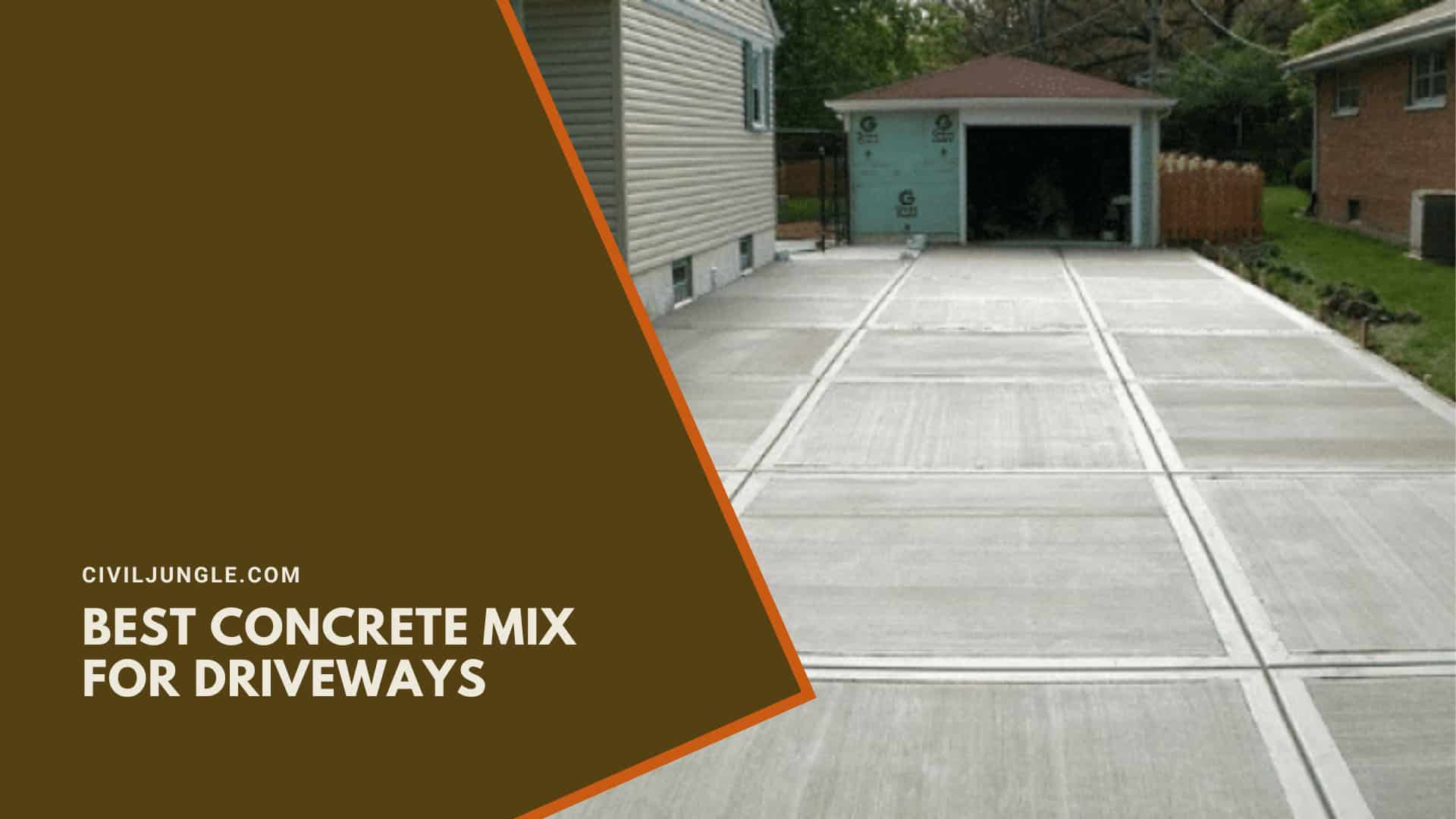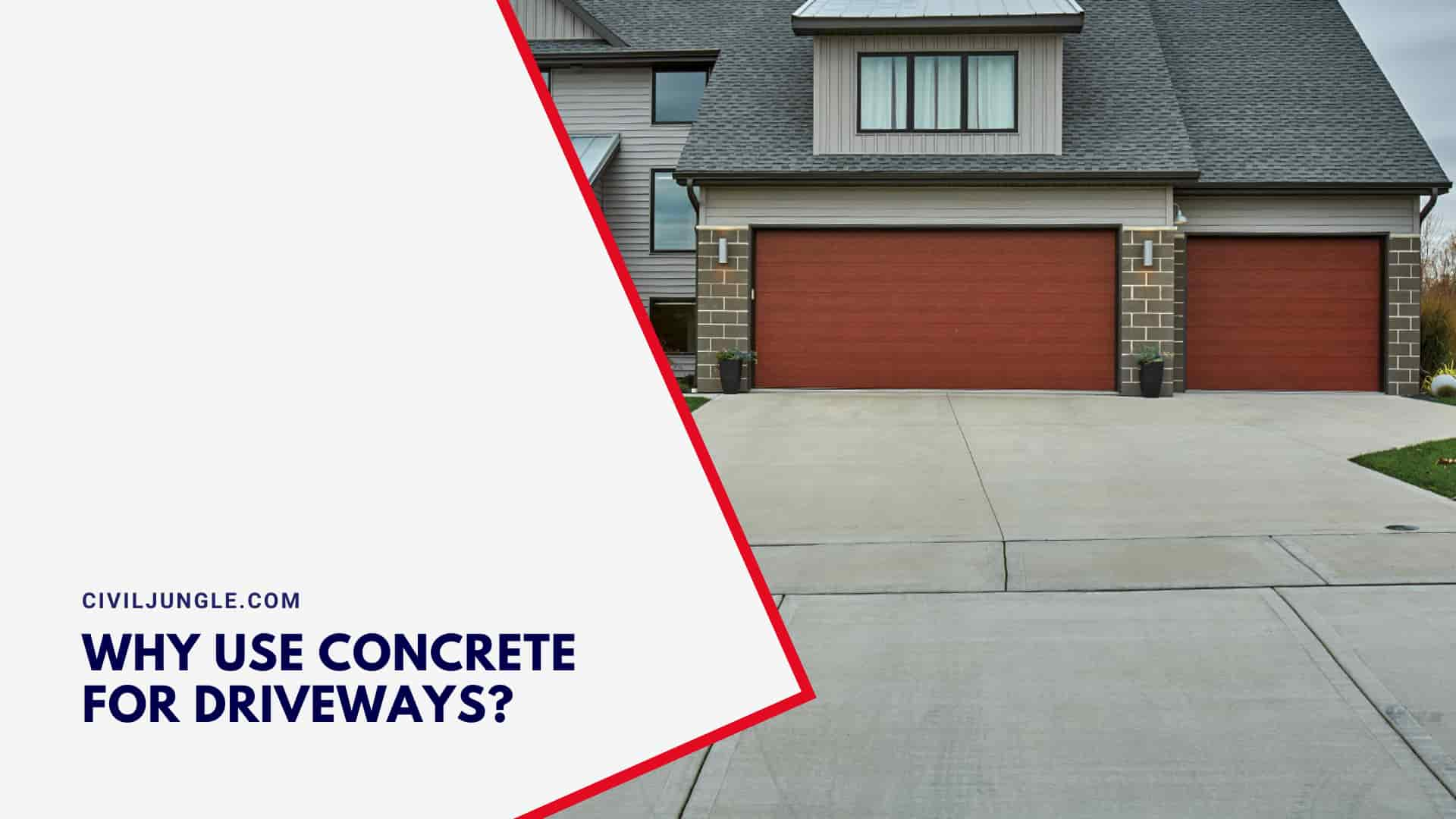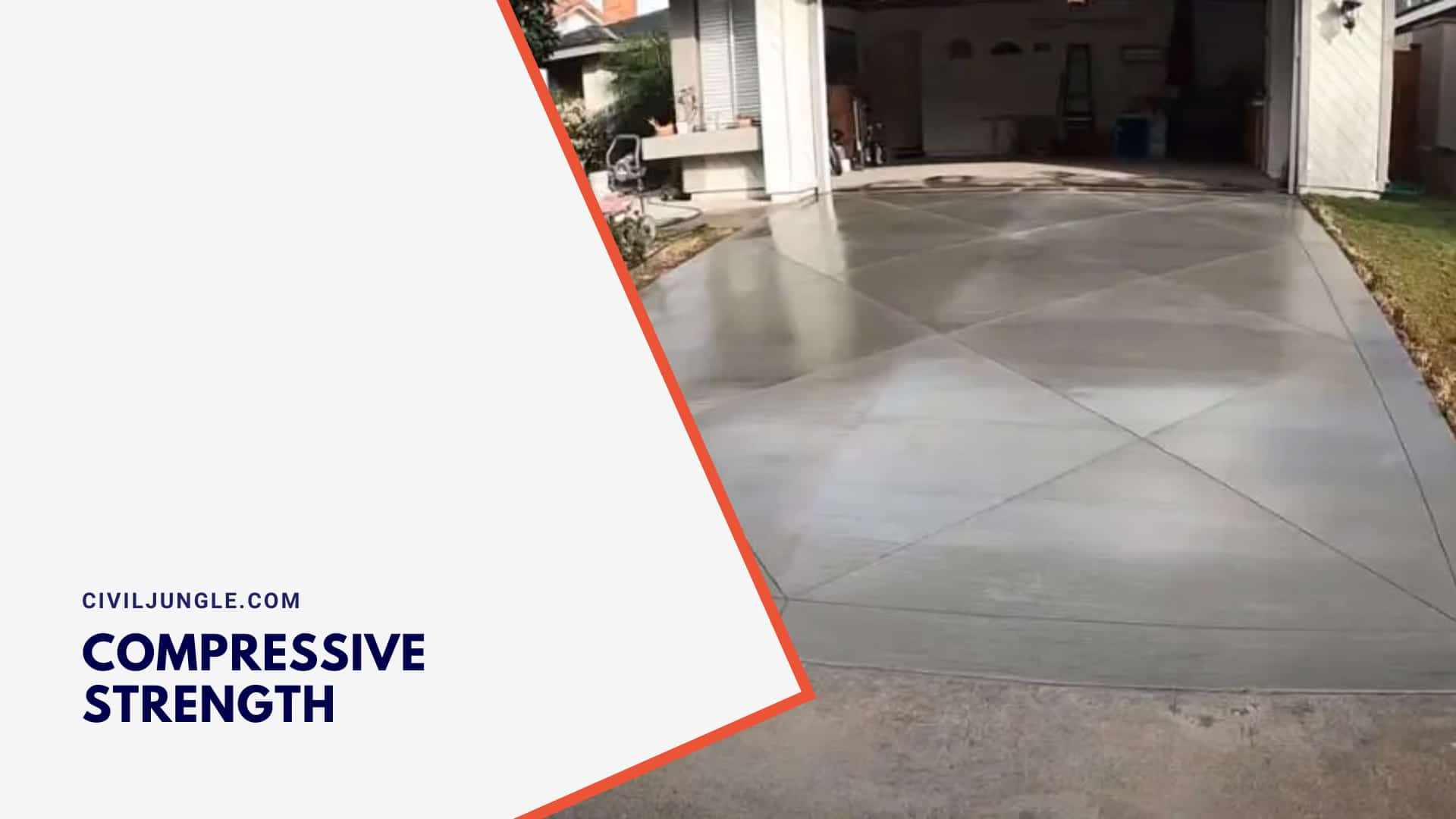Best Concrete Mix for Driveways
Important Point
The best concrete is the most widely used construction material. The new concrete driveway can cost a small fortune.
You’ll repair it, first need to determine if the driveway is damaged. The concrete mix added to the project site dilutes the water-cement ratio.
Concrete is a versatile construction material used that’s all over the world. The driveway concrete mix will bear traffic with vehicles of different sizes and weights.
Concrete is used in the driveway by most professionals and homeowners. It’s inexpensive.
The best concrete mix for driveways has at least 3500 psi compressive strength and is 5-6 inches thick over compacted gravel, and the earth has a water-to-cement ratio of 0.50 and an aggregate of less than an inch.
Concrete driveways are subject to the elements and extreme loads from parked cars and trunks.
A concrete driveway is part of concrete paving. The concrete mixture used for this is water, gravel, and other chemicals that its color and durability.
Concrete driveways are exposed to elements regularly. Concrete is the material for driveways and good reason.
The best concrete mixes the driveways, along with many pro tips and tricks.
Why Use Concrete For Driveways?
Concrete driveways are easy to mix yourself. It’s made from sand, cement, and an aggregate like a stone. Concrete is also employed if properly maintained.
People used pavers, blacktop, and gravel to build a driveway. A wheelbarrow, a mixing tray, and simple hand tools like a shovel, hoe, and trowel.
Concrete is a build a driveway with fantastic material. It is very strong, fairly cheap, and attractive.
Concrete is a mix for very easy. It is made from cement, sand, and an aggregate-like stone.
And more than stone makes stronger concrete a little to work. The right thickness, and as long as you use strong concrete mix, is more than enough to a strong handle car and truck loads.
The concrete edges and a long were bought home for very little money. And there is no need for a saw or any power tools expensive. Concrete is also employed if properly maintained.
Useful Article for You
- Why Do They Put Gravel on Roof
- Why Are Blocks Placed in Trenches
- Why Is Knowing Properties of Matter Important for Engineers?
- Why Are They Called Cinder Blocks
- Why Is It Called a Flight of Stairs
- Why Does Mortar Crack When Drying
- Why Is Quicksand Called Quicksand
- Why Is It Called a Pony Wall
- Why Is an I Beam So Strong
- Why Does Concrete Get Hot
- Super Plasticizer Admixture
- Why Are Plasticizers Added to Polymers
- Why Are My Tiles Popping Up
- Why Do They Put Lines in Concrete
- Why Is It Called the Golden Gate Strait
- Does Concrete Have Lime in It
- Why Are Arches So Strong
- Why Is Fly Ash Used in Concrete
- Why Does Concrete Have Lines
- Why Is Bamboo So Strong
- Why Is Cedar Wood Good
- Why Are Washers Called Washers
- Why Are Dead Load and Live Load Considered Separately? How Do They Affect the Structure Differently?
- Why Is My Water Not Staying Hot
- Why Is It Called Rebar
- Why Does Concrete Harden
- Why Is 37 Degrees the Best Angle for Stairs
- Why Is It Called Portland Cement
Compressive Strength
Concrete compressive strength is an important factor to consider when constructing a driveway. The concrete-to-compressive strength is the rating of compression material that can resist.
Compressive concrete combines water, stone, lime, and Portland cement. The right mixture for your very important driveway. And we use a 3500 psi mix for a residential driveway with 4” thick concrete.
The types of compressive strength are resistant to compressive stresses, the weight of an automobile.
Compressive strength to the concrete aspect to consider is creating a driveway. Concrete very typically has compressive strength and low tensile strength.
The compressive strength of the pressure of the concrete mix makes for more concrete. Concrete typically has very high compressive strength and down tensile strength.
Useful Article for You
- Types of Cranes
- Types of Shovels
- Dry Pack Mortar
- Zero Force Members
- What Is Pad Foundation
- Hempcrete Vs Concrete
- What Is a Contour Interval
- How to Build a Shower Pan
- Bitumen Road Layers Thickness
- How Much Is a Yard of Concrete
- Queen Size Bed Dimensions in Feet
- What Is Pier and Beam Foundation
- How to Use Concrete Bonding Adhesive
- Isometric View
- How Much Does a Gallon on Water Weigh
- The Purpose of a Bridge
- Type of Table
- Is Garage Calculated in Square Footage
- Standard Toilet Water Line Size
- Types of Door Construction
- How Much Is a Yard of Concrete
- Lean to Roof
- Pile Foundation Cost Calculator
- What Is a Pitched Roof
- Gradient Road
The Water-Cement Ratio
Concrete water is a very important part of the strong mixing concrete because it is very important to measure the water carefully.
A typical 80lb bag of concrete has about 3 quarts of water. The concrete has too little water, and the driveway is prone to cracks, buckling, and deterioration.
The concrete with your should be semi-solid and resemble thick oatmeal. A greater concrete’s strength and durability.
The percentage, the weaker and less durable the concrete produced. The water should not be added to the concrete mix. The project will be the water-cement ratio.
Air-entrained Concrete Mix
Air-entrained concrete is an admixture of spherical-shaped air bubbles approximately one hundredth to one-thousand of an inch in size.
Air bubbles increase the workability of the concrete and lower the water-cement ratio. The entrained air makes concrete workable, so contractors use it for construction projects.
The manufacturers will add an air- air-entrainment value to concrete in some regions of the country.
The average amount of air entrainment in the driveways is 6% of the concrete mix. A concrete mix of putting internal pressure on the concrete.
Best Concrete Mix for Driveways
Generally, the best concrete mix for your driveway should have a compressive strength of at least 3500 psi to 4000 psi, a cement-water ratio of around 0.50 to improve the concrete’s longevity, and aggregates no larger than 1-inch in size with a slump of 4 to 5 inches.
Best Concrete Mix for Patio
The ideal concrete for a new patio that won’t chip, crack, or spall anytime soon under all of the pressures of entertaining (literal and figurative) needs high-compressive strength like Quikrete 5000 Concrete Mix.
Best Concrete Mix for Smooth Finish
Quikrete Concrete Countertop Mix was made for this type of project — it’s fine compared to other mixes and gives a smoother finish. Quikrete’s Concrete Countertop Mix, in the blue bag, has super-plasticizer, a special ingredient that helps the mix flow better, and prevents shrinking, cracking and air bubbles.
Best Concrete Mix for Foundations
C25 is often used as a foundation concrete mix when pouring foundations (footings). It is also the ideal concrete for domestic slab foundations for house and bungalow floors.
Concrete Driveway Cost
Installing a concrete driveway typically costs $4 to $15 per square foot. Expect to pay more for a large, long driveway, especially if it has a unique shape. This project generally ranges from $2,340 to $7,500 (including removing existing concrete) but can go as high as $10,000 or more.
Concrete Vs Asphalt Driveway
Overall, the difference between asphalt and concrete driveways is that asphalt is less durable than concrete. With proper maintenance, it can last 30 years. Alternatively, concrete provides a sturdy, long-lasting option and can last homeowners 50+ years with occasional repairs and degreasing.
Asphalt Vs Concrete
Asphalt is generally cheaper and quicker to install, making it a popular choice for smaller projects or those with a tight budget. However, concrete has a longer lifespan and requires less maintenance, making it a better choice for larger projects or those with heavy traffic.
Concrete Driveway Installation
- Step 1: Demo the driveway. Before any major digging can happen, you have to call a utility locating service to ensure you don’t damage any electric, gas, or water lines.
- Step 2: Add mesh wire.
- Step 3: Pouring the concrete.
- Step 4: Brushed finish.
- Step 5: Setting the concrete
Air-Entrained Concrete Problems
With respect to finishability, excess air entrainment can reduce the hard-trowel finishability of concrete, which can result in several very objectionable problems, such as blistering and delamination’s.
When Not to Use Air-Entrained Concrete?
4.1 Air-entraining agents should not be used in floors that are to have a dense, smooth, hard troweled surface. 6.2. 7 An air entraining agent should not be specified or used for concrete to be given a smooth, dense, hard-troweled finish because blistering or delamination may occur.
Air Entrained Concrete Uses
Air-Entraining Admixtures and What They Do: Air-entraining admixtures facilitate the development of a system of microscopic air bubbles within concrete during mixing. They increase the freeze-thaw durability of concrete, increase resistance to scaling caused by deicing chemicals, and improve workability.
Like this post? Share it with your friends!
Suggested Read –




Leave a Reply